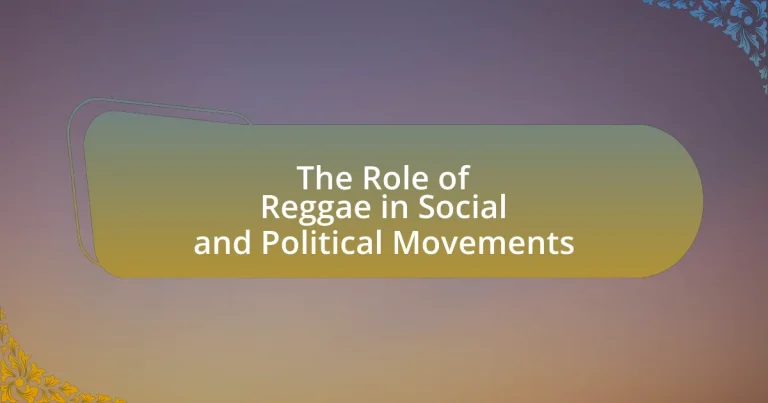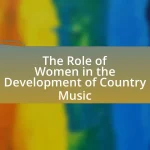Reggae is a musical genre that originated in Jamaica in the late 1960s, playing a crucial role in social and political movements by expressing themes of resistance, social justice, and cultural identity. The genre has been a powerful medium for artists like Bob Marley and Peter Tosh, who addressed issues such as oppression, inequality, and human rights through their music. Reggae’s influence extends globally, impacting movements like anti-apartheid in South Africa and civil rights in the United States. The article explores the historical context of reggae, its connection to Rastafarian beliefs, and the challenges faced by artists in maintaining authenticity while promoting social change. Additionally, it examines how contemporary reggae artists continue to address modern social issues and the implications of commercialization on the genre’s message.
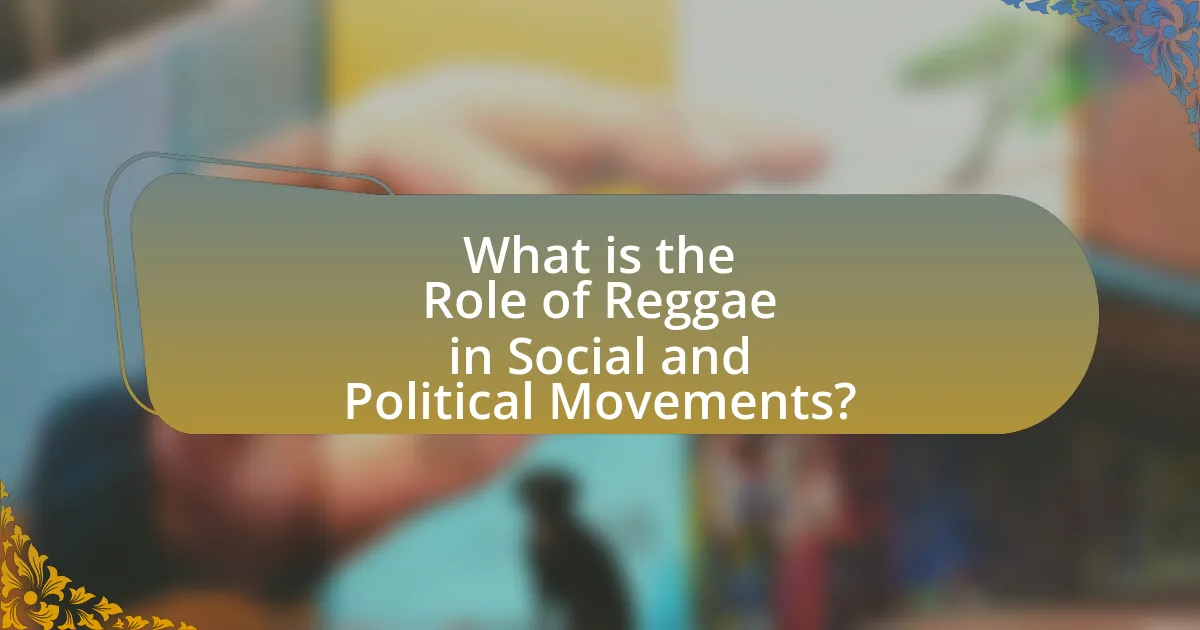
What is the Role of Reggae in Social and Political Movements?
Reggae plays a significant role in social and political movements by serving as a powerful medium for expressing resistance, social justice, and cultural identity. Originating in Jamaica in the late 1960s, reggae music often addresses themes of oppression, inequality, and the struggles of marginalized communities. For instance, artists like Bob Marley used their music to advocate for political change and raise awareness about issues such as poverty and human rights, exemplified in songs like “Get Up, Stand Up,” which calls for activism against injustice. The genre has also influenced global movements, such as the anti-apartheid struggle in South Africa, where reggae music became a symbol of resistance against oppression. Thus, reggae not only reflects the socio-political climate of its time but also actively contributes to mobilizing communities and inspiring change.
How did reggae music emerge as a tool for social change?
Reggae music emerged as a tool for social change by articulating the struggles and aspirations of marginalized communities, particularly in Jamaica during the 1960s and 1970s. This genre, rooted in Rastafarian culture, addressed issues such as poverty, inequality, and political oppression, resonating with listeners who faced systemic injustices. Artists like Bob Marley and Peter Tosh used their music to promote messages of resistance and empowerment, exemplified in songs like “Get Up, Stand Up,” which called for social action and human rights. The global reach of reggae further amplified its impact, inspiring movements for social justice beyond Jamaica, as seen in its influence on anti-apartheid activism in South Africa and civil rights movements in the United States.
What historical events influenced the development of reggae music?
The development of reggae music was significantly influenced by the social and political landscape of Jamaica in the 1960s and 1970s. Key events include Jamaica’s independence from British colonial rule in 1962, which fostered a sense of national identity and cultural pride, leading to the emergence of reggae as a distinct musical genre. Additionally, the rise of Rastafarianism during this period played a crucial role, as its themes of resistance, social justice, and spirituality were deeply woven into reggae lyrics. The political turmoil and violence in Jamaica, particularly during the 1970s, also shaped reggae music, as artists like Bob Marley used their platforms to address issues such as poverty, inequality, and human rights, further solidifying reggae’s connection to social and political movements.
How did reggae artists respond to social injustices?
Reggae artists responded to social injustices by using their music as a platform to address issues such as poverty, inequality, and political oppression. Prominent figures like Bob Marley and Peter Tosh highlighted the struggles of marginalized communities, advocating for social change through powerful lyrics and public performances. For instance, Marley’s song “Get Up, Stand Up” calls for resistance against oppression, while Tosh’s “Equal Rights” explicitly demands justice and equality. These artists not only raised awareness but also inspired activism, contributing to movements for civil rights and social reform in Jamaica and beyond. Their work reflects a deep commitment to social justice, making reggae a significant voice in political movements.
Why is reggae considered a voice for the marginalized?
Reggae is considered a voice for the marginalized because it addresses social injustices, inequality, and the struggles of oppressed communities. Originating in Jamaica during the 1960s, reggae music often reflects the experiences of the poor and disenfranchised, using lyrics to highlight issues such as poverty, racism, and political corruption. For instance, artists like Bob Marley and Peter Tosh used their music to advocate for civil rights and social change, resonating with audiences facing similar challenges. This genre’s roots in Rastafarian culture further emphasize themes of resistance and empowerment, making reggae a powerful medium for marginalized voices to express their realities and aspirations.
What themes are prevalent in reggae lyrics related to social issues?
Prevalent themes in reggae lyrics related to social issues include resistance to oppression, social justice, and unity among marginalized communities. Reggae often addresses the struggles against colonialism and systemic racism, reflecting the historical context of Jamaica and the African diaspora. For instance, artists like Bob Marley and Peter Tosh have used their music to advocate for human rights and equality, emphasizing the importance of fighting against injustice. The lyrics frequently highlight the need for empowerment and solidarity, resonating with movements for civil rights and social change globally.
How do reggae songs reflect the struggles of oppressed communities?
Reggae songs reflect the struggles of oppressed communities by addressing themes of social injustice, inequality, and resistance. These songs often highlight the experiences of marginalized groups, particularly in Jamaica, where reggae originated as a response to colonialism and systemic oppression. For example, Bob Marley’s “Get Up, Stand Up” serves as an anthem for human rights, urging listeners to fight against oppression and demand justice. Additionally, the lyrics of Peter Tosh’s “Equal Rights” explicitly call for equality and highlight the struggles faced by the disenfranchised. The genre’s roots in Rastafarianism further emphasize the fight against oppression, as it promotes messages of empowerment and resilience among oppressed populations.
In what ways has reggae influenced political movements?
Reggae has significantly influenced political movements by serving as a powerful medium for social commentary and activism. The genre emerged in Jamaica during the 1960s, reflecting the struggles against colonialism and social injustice, which resonated with marginalized communities. Artists like Bob Marley used their music to address issues such as poverty, inequality, and human rights, notably in songs like “Get Up, Stand Up,” which became anthems for various civil rights movements globally.
Moreover, reggae’s connection to Rastafarianism has further amplified its political impact, promoting messages of resistance against oppression and advocating for the rights of African descendants. The genre has inspired movements in countries like South Africa during apartheid, where reggae music was used to unify and mobilize people against the regime.
In summary, reggae has influenced political movements by providing a voice for the oppressed, fostering unity, and inspiring activism through its socially conscious lyrics and cultural significance.
What notable political movements have been associated with reggae music?
Reggae music has been notably associated with the Rastafarian movement, which emerged in Jamaica during the 1930s and advocates for the spiritual and cultural identity of people of African descent. This genre also played a significant role in the anti-colonial movements across the Caribbean and Africa, particularly during the 1960s and 1970s, as artists like Bob Marley used their music to promote messages of resistance against oppression and social injustice. Additionally, reggae has been linked to the civil rights movement in the United States, where its themes of equality and freedom resonated with activists. The genre’s lyrics often reflect political struggles, making it a powerful tool for social change and awareness.
How have reggae artists participated in activism?
Reggae artists have actively participated in activism by using their music as a platform to address social and political issues. For instance, Bob Marley’s songs like “Get Up, Stand Up” and “Redemption Song” advocate for human rights and social justice, reflecting the struggles of marginalized communities. Additionally, artists such as Peter Tosh have highlighted issues like racial inequality and the fight for legalizing marijuana, as seen in his song “Legalize It.” These artists not only raise awareness through their lyrics but also engage in public demonstrations and campaigns, further solidifying reggae’s role in promoting activism and social change.
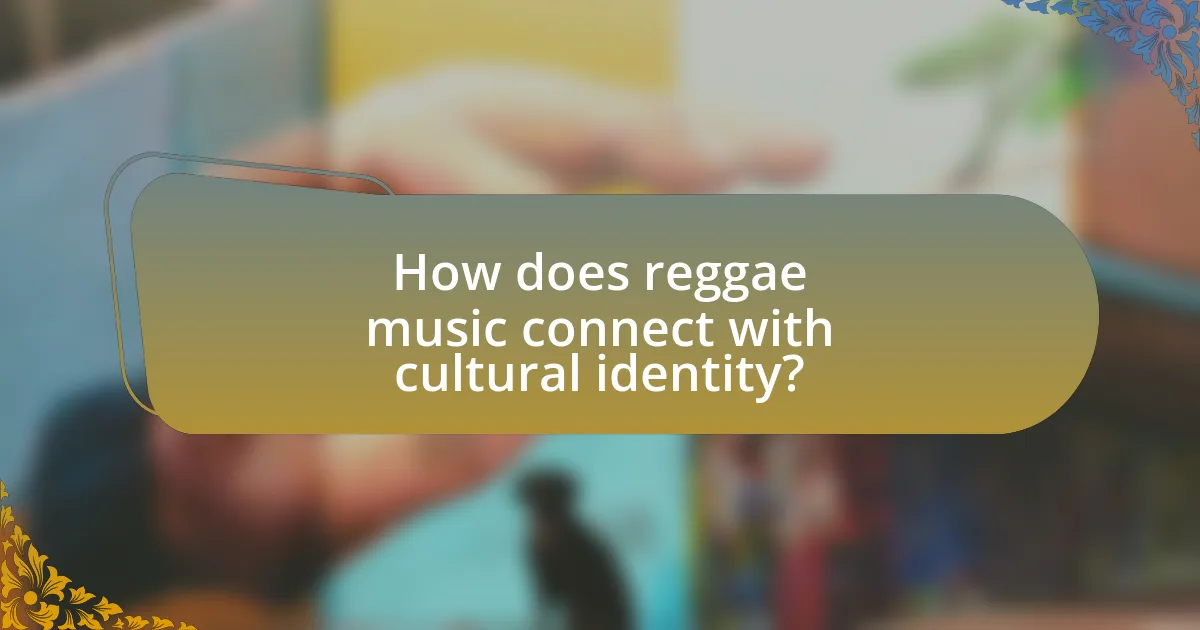
How does reggae music connect with cultural identity?
Reggae music connects with cultural identity by serving as a powerful expression of the social, political, and spiritual experiences of the Jamaican people. Originating in the 1960s, reggae reflects the struggles against colonialism, poverty, and social injustice, which are integral to Jamaican history and identity. The genre incorporates elements of Rastafarian beliefs, emphasizing themes of resistance, unity, and cultural pride, thereby reinforcing a collective identity among its listeners. For instance, artists like Bob Marley used reggae to address issues such as inequality and oppression, making the music a vehicle for cultural expression and social commentary. This connection is further evidenced by reggae’s global influence, where it has inspired movements advocating for social justice and cultural awareness worldwide.
What role does reggae play in the expression of Jamaican culture?
Reggae serves as a vital medium for expressing Jamaican culture by encapsulating the island’s social, political, and spiritual narratives. This genre emerged in the 1960s, reflecting the struggles and aspirations of the Jamaican people, particularly through lyrics that address issues such as poverty, inequality, and resistance against oppression. For instance, artists like Bob Marley used reggae to promote messages of unity and social justice, which resonated deeply within the context of Jamaica’s historical struggles, including colonialism and economic hardship. The global popularity of reggae further amplifies its role, allowing Jamaican culture to influence and connect with diverse audiences worldwide, thereby reinforcing its cultural significance.
How does reggae music incorporate elements of Rastafarian beliefs?
Reggae music incorporates elements of Rastafarian beliefs primarily through its lyrical themes, which often emphasize social justice, spirituality, and resistance against oppression. The genre frequently addresses issues such as inequality, colonialism, and the struggles of the African diaspora, reflecting the Rastafarian commitment to social change and empowerment. For instance, artists like Bob Marley have used their music to promote messages of unity, love, and the importance of connecting with one’s roots, which are central tenets of Rastafarian philosophy. Additionally, reggae’s use of biblical references and the celebration of figures like Haile Selassie I, viewed as a messianic figure in Rastafarianism, further solidifies the connection between the music and the belief system.
What impact does reggae have on the global perception of Jamaican identity?
Reggae significantly shapes the global perception of Jamaican identity by promoting cultural pride and social awareness. The genre, originating in Jamaica in the late 1960s, embodies themes of resistance, unity, and social justice, which resonate with audiences worldwide. Artists like Bob Marley have become global symbols of Jamaican culture, with songs such as “One Love” and “Get Up, Stand Up” advocating for peace and equality. This international recognition of reggae has led to a broader understanding of Jamaica as a nation rich in cultural heritage and resilience, influencing how people perceive Jamaican identity beyond stereotypes. The genre’s association with the Rastafarian movement further emphasizes themes of spirituality and social justice, reinforcing Jamaica’s image as a center for cultural and political activism.
How has reggae music evolved over time in relation to social issues?
Reggae music has evolved significantly over time in relation to social issues, transitioning from a focus on local Jamaican struggles to addressing global themes of inequality and injustice. Initially, reggae emerged in the late 1960s, heavily influenced by Rastafarian beliefs, which emphasized social justice, anti-colonialism, and the struggles of the marginalized in Jamaica. Artists like Bob Marley used their music to highlight issues such as poverty, oppression, and racial discrimination, exemplified in songs like “Get Up, Stand Up” and “Redemption Song.”
As reggae gained international popularity in the 1970s and 1980s, its themes expanded to encompass broader social issues, including human rights and political activism worldwide. The genre became a voice for various movements, addressing issues like apartheid in South Africa and civil rights in the United States. For instance, the collaboration between reggae artists and activists during the One Love Peace Concert in 1978 showcased reggae’s role in promoting peace and unity amidst political turmoil.
In recent decades, reggae has continued to evolve, incorporating elements of hip-hop and dancehall while maintaining its roots in social commentary. Contemporary artists address issues such as climate change, gender equality, and systemic racism, reflecting the ongoing relevance of reggae in social discourse. This evolution illustrates reggae’s adaptability and its enduring commitment to advocating for social justice and change.
What changes in reggae music reflect shifts in social and political landscapes?
Changes in reggae music reflect shifts in social and political landscapes through the evolution of lyrical themes and the incorporation of contemporary issues. For instance, the early reggae of the 1960s and 1970s, exemplified by artists like Bob Marley, focused on themes of resistance against colonialism and social injustice, mirroring the struggles for independence in Jamaica and the wider Caribbean. As political climates shifted, reggae began to address issues such as poverty, violence, and systemic inequality, particularly during the 1980s and 1990s, with artists like Peter Tosh advocating for human rights and social change. The emergence of dancehall in the late 1980s introduced a more commercial sound but also reflected the socio-economic challenges faced by urban youth, addressing topics like crime and survival. This evolution illustrates how reggae music has continuously adapted to reflect the changing social and political realities of its time, serving as both a voice for the marginalized and a commentary on societal issues.
How do contemporary reggae artists address modern social challenges?
Contemporary reggae artists address modern social challenges by using their music as a platform to raise awareness about issues such as inequality, violence, and environmental concerns. For instance, artists like Protoje and Koffee incorporate themes of social justice and activism in their lyrics, directly confronting systemic racism and advocating for change. The song “Blood Money” by Protoje critiques corruption and economic disparity, while Koffee’s “Toast” celebrates resilience and empowerment in the face of adversity. These artists not only reflect societal issues but also inspire their audiences to engage in activism, demonstrating reggae’s enduring role in social and political movements.
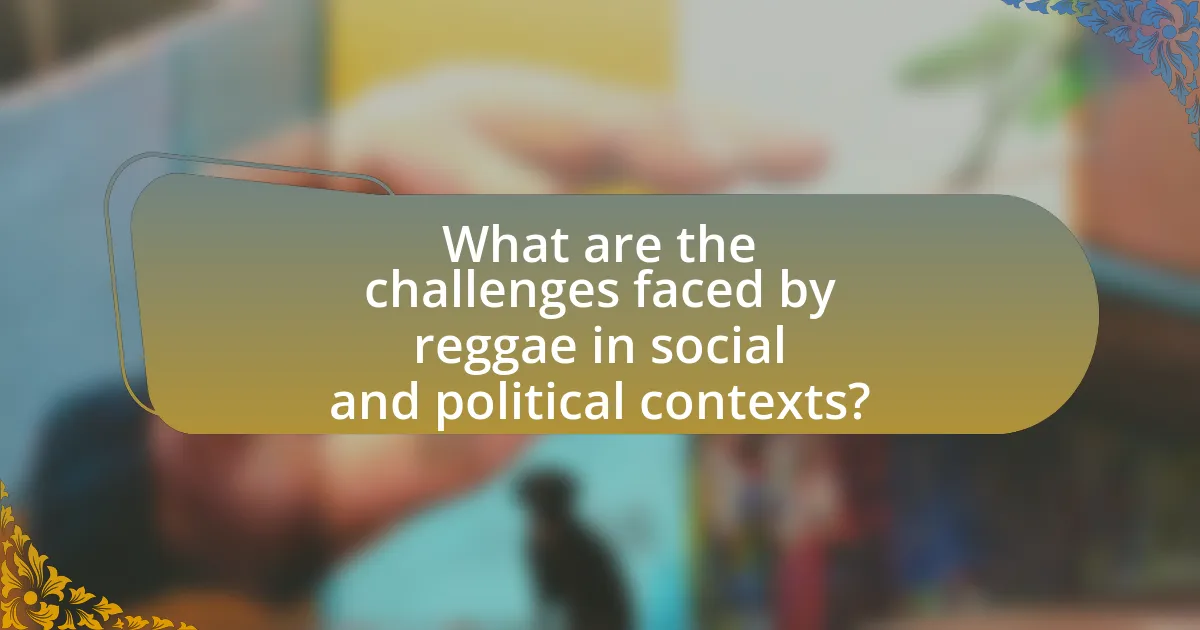
What are the challenges faced by reggae in social and political contexts?
Reggae faces significant challenges in social and political contexts, primarily due to its association with resistance movements and the commercialization of its message. The genre often struggles against censorship and misrepresentation, as governments and media may portray reggae as a threat to social order, particularly when it addresses issues like inequality and injustice. For instance, in Jamaica, reggae artists have faced legal repercussions for their politically charged lyrics, which can lead to a chilling effect on artistic expression. Additionally, the global commercialization of reggae has diluted its original messages, leading to a disconnect between the music and its roots in social activism. This commercialization often prioritizes marketability over authenticity, undermining the genre’s potential to effect social change.
How has commercialization affected the message of reggae music?
Commercialization has diluted the original message of reggae music, shifting its focus from social and political activism to mainstream appeal and profit. Historically, reggae emerged as a voice for the marginalized, addressing issues like poverty, inequality, and resistance against oppression, as exemplified by artists like Bob Marley, whose songs often contained strong political messages. However, with the rise of commercialization in the 1980s and 1990s, reggae began to prioritize commercial success, leading to a proliferation of themes centered around partying, romance, and materialism. This shift is evident in the mainstream popularity of sub-genres like dancehall, which often emphasize entertainment over the genre’s foundational messages of resistance and social justice. Consequently, the commercialization of reggae has resulted in a significant transformation of its lyrical content, moving away from its roots in activism and community empowerment.
What are the implications of mainstream success for reggae artists?
Mainstream success for reggae artists often leads to increased visibility and financial opportunities, but it can also result in the dilution of their cultural message. When reggae artists achieve mainstream recognition, they gain access to larger audiences and commercial platforms, which can enhance their ability to promote social and political messages inherent in reggae music. For instance, artists like Bob Marley utilized mainstream success to advocate for social justice and political change, influencing movements in Jamaica and beyond.
However, this success can also lead to a commercialization of reggae, where the original messages of resistance and empowerment may be overshadowed by market demands. The shift towards more commercially viable sounds can alienate core fans and dilute the genre’s roots in social and political activism. This phenomenon is evident in the way some contemporary reggae artists adapt their music to fit mainstream tastes, potentially compromising the authenticity of their message. Thus, while mainstream success can amplify the reach of reggae artists, it also poses risks to the integrity of the genre’s cultural and political significance.
How do artists navigate the balance between commercial appeal and social messages?
Artists navigate the balance between commercial appeal and social messages by strategically integrating meaningful themes into their work while maintaining accessibility for a broader audience. For instance, reggae artists often use catchy melodies and rhythms to attract listeners, while embedding lyrics that address social issues such as inequality, injustice, and resistance. This dual approach allows them to reach commercial success without sacrificing their commitment to social commentary. A notable example is Bob Marley, whose songs like “Get Up, Stand Up” and “One Love” achieved widespread popularity while promoting messages of empowerment and unity, demonstrating that commercial viability can coexist with impactful social messages.
What barriers exist for reggae music in promoting social change?
Barriers for reggae music in promoting social change include commercialization, cultural appropriation, and political repression. Commercialization often dilutes the original messages of reggae, transforming it into a product that prioritizes profit over social advocacy. Cultural appropriation can lead to misrepresentation and a loss of authenticity, undermining the genre’s roots in social justice. Political repression, particularly in regions where reggae originated, can stifle artists’ voices and limit their ability to address pressing social issues. For instance, in Jamaica, artists have faced censorship and violence for their politically charged lyrics, which hinders the potential for reggae to effect meaningful change.
How do political climates impact the reception of reggae music?
Political climates significantly influence the reception of reggae music by shaping its themes and the audience’s engagement. In politically charged environments, reggae often serves as a voice for resistance and social justice, resonating with listeners who identify with its messages of struggle and empowerment. For instance, during the 1970s in Jamaica, the political turmoil and violence led to reggae becoming a medium for expressing dissent against oppressive regimes, as seen in the works of artists like Bob Marley, whose songs like “Get Up, Stand Up” directly addressed social injustices. This connection between reggae and political activism enhances its reception among audiences seeking solidarity and change, demonstrating that the political context can elevate the music’s relevance and impact.
What challenges do reggae artists face in maintaining authenticity?
Reggae artists face significant challenges in maintaining authenticity due to commercialization, cultural appropriation, and evolving musical trends. Commercialization pressures artists to alter their sound and message to appeal to broader audiences, often diluting the genre’s roots in social and political commentary. Cultural appropriation complicates authenticity as non-reggae artists may adopt reggae styles without understanding or respecting its cultural significance, leading to a misrepresentation of the genre. Additionally, the rise of digital platforms and changing listener preferences can push reggae artists to adapt their music, risking the loss of traditional elements that define authenticity. These factors collectively threaten the integrity of reggae as a vehicle for social and political expression.
What practical steps can reggae artists take to enhance their impact on social movements?
Reggae artists can enhance their impact on social movements by actively engaging in community outreach and advocacy. By organizing and participating in events that raise awareness about social issues, such as poverty, inequality, and human rights, reggae artists can leverage their influence to mobilize fans and communities. For instance, Bob Marley used his platform to address social injustices in Jamaica, which helped to galvanize support for the Rastafarian movement and broader social change. Additionally, collaborating with NGOs and grassroots organizations can amplify their message and provide resources for effective activism. This approach not only strengthens the connection between music and social issues but also fosters a sense of solidarity among listeners, encouraging them to take action.
